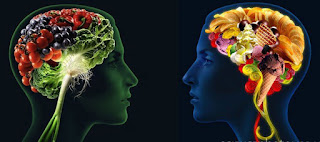Mental Health and Nutrition
The symptoms are usually severe anxiety and depression. The Depression and Related Diseases Association (CDC) says depression will become the leading medical issue in the world by 2030.
It shouldn't surprise you that many people are still seeking new methods. To prevent mental health conditions instead of using existing treatments to treat the problem themselves.
Nutritional physiology is one of the emerging areas of research. That is primarily focused on the role nutrition can play in developing mental disorders and curing them.
Mental Health and Nutrition
Many individuals do not understand that diet can cause depression and that nutrition can cause physical health problems.
Depression is generally considered as being biochemical and emotionally underlying. In contrast, food plays an important part in depression.
Often, food patterns that precede depression appear similar. This includes low appetite, skipped meals if possible, and a dominant desire to have sweets is common.
The Science Behind Food and Mood
The connection between food and emotions comes from an intimate connection between the brain and your intestines, sometimes named the “second brain."
Your intestinal tract contains millions of micro-organisms that control neurotransmitters, chemicals that send messages from the gut to the brain.
Dopamine is a common example of serotonin. Having good foods increases bacterial development and improves neurotransmitter production.
In contrast, an unhealthy diet can cause inflammation and inhibit production.
➡ Carbohydrates
Carbohydrates are natural polysaccharides and play primarily ion transport roles in the structure and functionality of organisms.
Various research has shown that these chemicals affect the brain's mood. Eating a meal that has a high carbohydrate intake stimulates blood insulin release.
Insulin allows glucose in the blood and allows energy to enter cells and simultaneously triggers the introduction of tryptophan to the mind.
Tryptophan has negative effects on neurotransmitters.
➡ Proteins
Proteins contain amino acids that are vital components of our bodies. The cellular system produces 12 dietary acids.
Whereas the rest of these dietary amino acids need to be consumed. A protein-rich diet provides the amino acids required.
Food that contains nutrient-rich proteins includes meats, milk products, and dairy products. Plant proteins, such as beans and peas, contain fewer essential amino acids than most plants.
Depending on the type of amino acid, the nutrient is important, and it also has the potential for cognitive and physical functions to be improved.
Several neurotransmitters are made of amino acids.
Recommended Read:
- Dinner Ideas and Recipes
- Mental Health Awareness
- Food Allergy
- Lifestyle Detox | How can you Detox?
- Apple Fitness Plus
Frequently Asked Questions on Mental Health and Nutrition
To help maintain a healthy mind, you can eat plenty of fruits and vegetables and foods that include Omega 3-fatty acids, like salmon.
Dark green leafy vegetables particularly protect the mind. Nuts seedlings and legumes like beans & legumes make great brain food.
2. Does Food Really Affect Mental Health?
Every nutrient is important in promoting health in the brain, including vitamins, minerals, healthy fats, and fiber.
Following an optimal diet can improve your mental health and reduce the effects on your body.
3. How are Food and Mental Health Connected?
They have also found that nutrient deficiencies are associated with worsening mood, heightened anxiety, and decreased depression risk.
4. What Foods Make Your Mental Health Worse?
Processed foods. Those who eat processed foods and beverages often experience anxiety.
Keeping your steel in good shape requires a diet that is rich in fiber, fruits, veggies, and fish.
5. How Does Eating Healthy Affect Your Mental Health?
If people abide by a diet of good nutrition, they can reduce mood swings in a healthier manner. and have a better focus, she says.
Studies suggest diet can be useful in reducing depression and stress.
6. What Vitamins Should I Take for Better Mental Health?
The combination of vitamins B12 and folate improves serotonin and dopes. This vitamin also plays an important role in regulating mental wellbeing.
Research has suggested that high and low calories meals dense the mood. In order words, always try to eat balanced at all times.
You owe yourself a healthy life. I wish you all the best on your journey of nutrition and a healthy mental lifestyle.
I hope this was a great read. Let me know your thoughts and suggestions in the comment section below and also share this content (mental health and nutrition) with your active media accounts.
I will love to have you back sometime.









